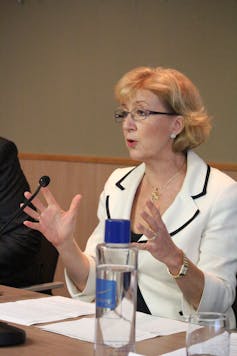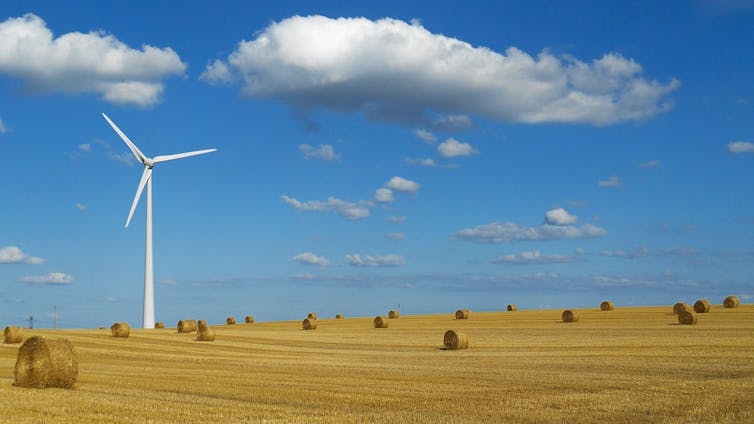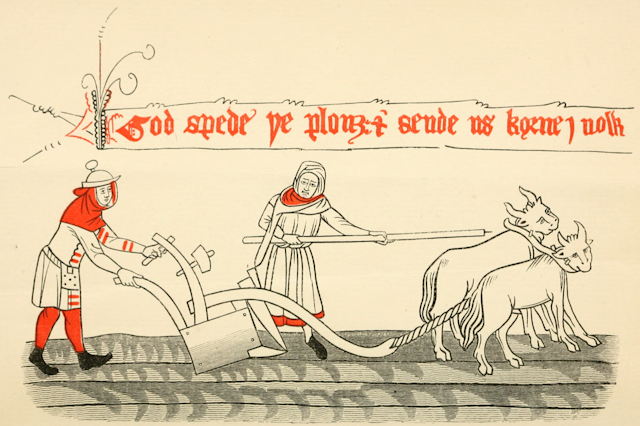Andrea Leadsom recently delivered a keynote speech on the future of British agriculture to a farming conference in Oxford – which was exactly what you’d expect the UK environment minister to do amid the uncertainty surrounding Brexit. Unfortunately, her agenda-setting address opened with the following mistake:
For an industry that’s been around as long as mankind itself, farming has been at the centre of human achievement.
While there is no reason to expect our national leadership to be well versed in human prehistory and evolution, it would be good to think that some of the fundamentals of our trajectory on this planet were a little better understood.

Crucially, I’d argue, understanding where agriculture as a basis of human subsistence fits into the narrative of human development might have important implications for how, at both national and international levels, the past and future impacts of farming might be better understood.
So first some basics. The term “mankind” is a dated and gendered term that has no place in public discourse. The language of “man the hunter”, “man the toolmaker”, “Neanderthal Man” or “Rhodesian Man” should just be consigned to the history books as part of an anthropological vocabulary which did much to separate our species along ever finer lines of division. We should talk about humans and humanity, and that’s what I am going to do here.
Footprints in prehistory
Now when we consider how long humans have been around, we get to play a little with definitions. If we want to be generous and welcoming to other closely related – but now extinct – species of relatively large-brained, tool-using, bipedal primates we might extend the definition of humanity to include all species of the genus Homo. On the basis of current fossil evidence this might take us back to 2.7m years ago. If we wish to exclude Homo habilis, Homo erectus, antecessor, heidelbergensis, neanderthalensis, floriensis, and all other non-modern humans, from that definition we might focus on our own species Homo sapiens, which we can trace in the fossil record for around some 200,000 years.
Working with either extreme of this definition (or any definition of humanity you might care to use in between), the domestication of plant and animal species – which define farming as mentioned by Leadsom – dates only to around 12,000 years ago.
So, however you choose to look at it, agriculture is a very recent addition to the repertoire of human subsistence, say between 1% and 5% of our time on the planet, depending on our definition of “human”. I’d argue that understanding this fact is really important if we are going to manage our continued existence on the planet.
In terms of the UK environment agriculture arrived, quite possibly, with colonising populations from France around 6,000 years ago. The arrival of Neolithic culture in the British Isles brought to the end a landscape which, until that time, had responded only to the rhythms of global climate change, wild herbivore grazing and the activities of the hunting and gathering populations of the Palaeolithic and Mesolithic periods.
Growing pains
Agriculture, as it grew, spread and intensified across Britain and brought with it the same transformations in human society and environment which we see with its appearance elsewhere on the planet – big changes in forest cover, soil erosion rates, hydrology, human population levels and social dynamics.

The adoption and spread of agriculture therefore underpinned a remarkable and rapid transformation of human society and the natural environment of the planet. Humanity, which evolved alongside quite dramatic cycles of global climate change for 3m years, has emerged in the few millennia since the adoption of farming as a significant force in shaping our planet’s future and have begun its first tentative steps on other planetary bodies.
Understanding quite how rapidly this change has come about in evolutionary time is important. The perspective, which the environment minister appears to share, which sees agriculture and the societies and technology predicated on farming as some immeasurably old and stable human condition does not help us put impact of modern agriculture on the planet in a useful perspective.
Shock of the new
Along the human timeline, farming should be seen as a relatively recent innovation – and I have little doubt it will form one of the key defining, planet-changing features of the Anthropocene era we have entered. It is therefore important to recognise how recent, in evolutionary time, the appearance of human agricultural societies are and what a truly transformative process engineering parts of the planet’s surface for crops and livestock has been.
Human societies are reliant on, and have been transformed by, agriculture – and there is no going back. To continue to expand and intensify global agriculture without safeguards to the environment – or without fully understanding our impact on the planet – is to stumble blindly and dangerously into the future.
Similarly, disregarding the trajectory of our prehistoric past, and failing to appreciate just how radical the changes of the past 12,000 years have been for our species, leaves us open to complacency at a time when we can afford to be anything but.

